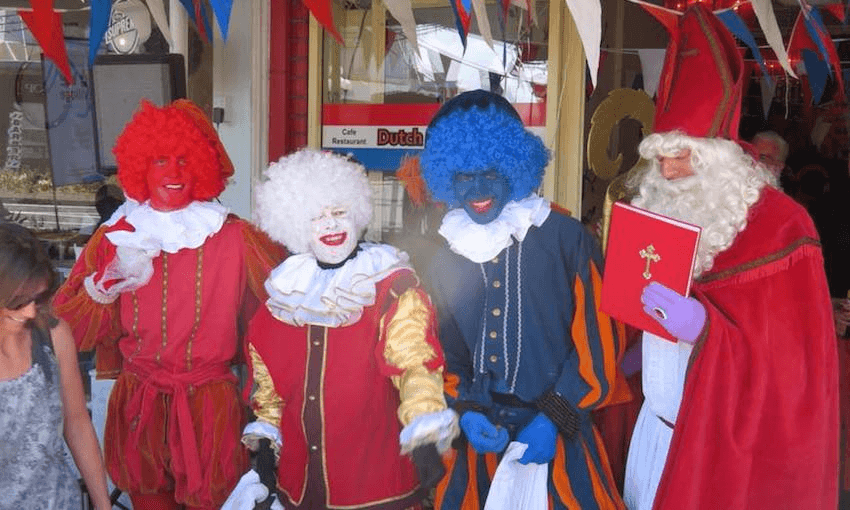While multiple New Zealand Christmas parades are maintaining the Dutch ‘black Pete’ character, one of the most famous has decided to end it. Willem van der Velde tells Alex Casey why.
A Dutch restaurant owner has told The Spinoff that blackface has no place in Christmas parades as it is hurtful to people. His comments come as the Netherlands Society in Rotorua have committed to keeping the controversial Black Pete character in their Christmas festivities this weekend, and the Hawera Lions club defended their prize-winning blackface float as “nothing to do with racism” earlier in the month.
Willem van der Velde is the owner of Birkenhead restaurant Dutch Delights, and has run their annual Sinterklaas parade for over 13 years. The Dutch Christmas tradition, with origins in the 19th century, features the character of Sinterklaas (based on St Nicholas) who has historically been accompanied by a “helper” named Zwarte Piet, or Black Pete. Pete is often portrayed as having a painted black face, red lips and a curly wig.
It’s a portrayal that has been actively condemned by the United Nations since 2015, who urged the Netherlands to do away with the harmful tradition. “The character of Black Pete is sometimes portrayed in a manner that reflects negative stereotypes of people of African descent,” reported the UN’s Committee on the Elimination of Racial Discrimination, “and is experienced by many people of African descent as a vestige of slavery.”
Previous to his arrival in New Zealand in 2004, van der Velde had played the character of Black Pete in Holland for over three decades. When he began Dutch Delights and launched the Sinterklaas parade in Birkenhead in 2006, he had no qualms around including the controversial character. “We never had problems with Pete because, to us, he was nothing to do with racism – he was the funny guy of the party. I think for 11 years there was no problem at all.”
That changed in 2015, when people took to social media to condemn the portrayal of Black Pete in the Birkenhead parade. “I did the Black Pete and a few days later I saw all these messages on Facebook,” says van der Velde. “I started getting one star ratings on Facebook, which I thought was odd because our restaurant is very popular and we do very well. Then I read the comments and they were all about how we were racist because of Black Pete.”
Van der Velde noticed that there was one man in particular who was commenting a lot on the blackface issue on Facebook at the time. “I sent him a message and invited him to my restaurant so we could have a conversation about it, and I could explain the tradition to him.” According to van der Velde, they had a “really nice” discussion about their positions on the tradition. “After speaking about Black Pete I told him, ‘if it hurts you, I won’t do it anymore’.”
“These Kiwis have nothing to do with my Dutch traditions, but of course if it hurts people then that’s a good enough reason to change it. For the kids, it doesn’t really matter anyway.”
Last year, the Birkenhead parade made the change for good. “We changed from Black Pete to different coloured Petes, using the three colours of the Dutch flag. When Sinterklaas arrives at the parade, he says to all the kids that they fell through a rainbow on the way to New Zealand, and that’s why the Petes faces are all different colours.”
“Everyone was happy with that,” says Van der Velde, gearing up for this seasons celebrations, beginning at 12pm today in Birkenhead. “It got some applause and it was a nice, great party. Nobody was upset, which was great. I just like everyone to be happy.”
The Bulletin is The Spinoff’s acclaimed, free daily curated digest of all the most important stories from around New Zealand delivered directly to your inbox each morning.



